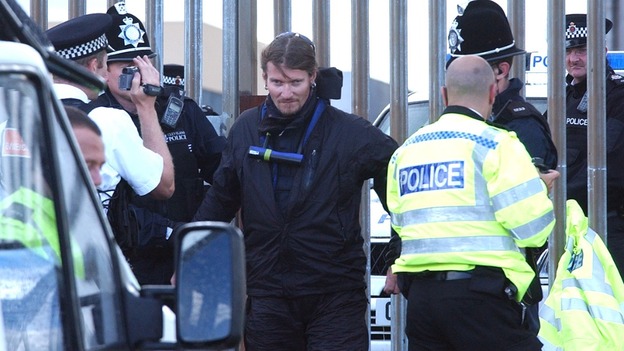Spycops in Scotland Exempt from Inquiry
Six of the exposed undercover political police were in Scotland, yet they are excluded from the Pitchford inquiry and the Scottish government is uninterested.
Today’s Sunday Herald reports that not only was Mark Kennedy the transport co-ordinator at the 2005 anti G8 protests in Scotland, but fellow officer Lynn Watson was there as part of the Action Medics team and Marco Jacobs is reported to have driven a minibus of activists up from England. Special Demonstration Squad officer Jason Bishop is also known to have attended.
Additionally, two of the women who received the extraordinary apology from the Metropolitan police earlier this month for being deceived into relationships with officers were taken to Scotland. Ostensibly going on holiday, John Dines was on paid duty when he took Helen Steel to Barra in 1990, and the same applied to Mark Cassidy’s visits to the country with a woman known as Alison.
The Met’s Assistant Commissioner Martin Hewitt frankly admitted that the way Dines and Jenner treated Helen Steel and Alison was
abusive, deceitful, manipulative and wrong. I acknowledge that these relationships were a violation of the women’s human rights, an abuse of police power and caused significant trauma.
Either the Scottish police were complicit in this by authorising the visits, or else they were mistreated by the Met who are obliged to get local police’s authorisation. Whichever, it is surely a serious issue for the Scottish police that such gross abuses took place in their jurisdiction.
But at First Minister’s Questions in the Scottish Parliament earlier this week, Nicola Sturgeon belittled the issue as mere “allegations of police impropriety” and dismissed a call for a Scottish inquiry.
A Scottish government spokesperson told the Sunday Herald they will
carefully consider the conclusions of the Pitchford Inquiry and, if there are measures over and above these safeguards which could sensibly be delivered in Scotland, we will discuss with Police Scotland and other interested parties how they might best be implemented.
The Pitchford Inquiry is limiting itself to actions in England and Wales, and is not expecting to report until summer 2018. Any recommendations would come somewhat later than that. Safeguards are only useful if they are implemented. One of the things the Met highlighted in their apology was that new, tougher rules were as blithely ignored as the old ones.
It is of particular concern that abuses were not prevented by the introduction of more stringent supervisory arrangements made by and pursuant to the Regulation of Investigatory Powers Act 2000.
But more to the point, this is not just about preventing similar abuses in future. Pitchford is concerned with uncovering the truth of what happened in the past.
As well as the known five, how many of the hundred-plus unknown officers were in Scotland too? What campaigns were stymied? Which Scottish citizens were abused?
It’s absurd that the Pitchford Inquiry says its priority is to find the truth yet wilfully blinds itself to a place of prolonged and intensive operations. It’s baffling that the Scottish government doesn’t want to know about ‘violations of human rights and abuse of police power’ perpetrated by English officers on Scottish soil.
Speaking for COPS, Lois Austin told the Herald
A dozen officers from these disgraced units have been exposed, and five of them worked in Scotland. If the English victims of the political secret police deserve justice, so do the Scots. The Scottish government should be demanding inclusion in Pitchford. If they don’t trust the UK government inquiry – or if it continues to slam the door in their face – then Scotland must surely have their own public inquiry.

